
The balafon is a gourd-resonated xylophone, a type of struck idiophone. It is closely associated with the neighbouring Mandé, Senoufo and Gur peoples of West Africa, particularly the Guinean branch of the Mandinka ethnic group, but is now found across West Africa from Guinea to Mali. Its common name, balafon, is likely a European coinage combining its Mandinka name ߓߟߊ bala with the word ߝߐ߲ fôn 'to speak' or the Greek root phono.
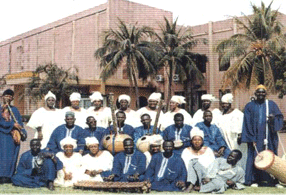
The music of Mali is, like that of most African nations, ethnically diverse, but one influence predominates: that of the ancient Mali Empire of the Mandinka. Mande people make up around 50% of Mali's population; other ethnic groups include the Fula (17%), Gur-speakers 12%, Songhai people (6%), Tuareg and Moors (10%).

A griot is a West African historian, storyteller, praise singer, poet, and/or musician.

Kandia Kouyaté is a Malian jelimuso and kora player; she has earned the prestigious title of ngara, and is sometimes called La dangereuse and La grande vedette malienne. Kouyaté's dense, emotional, hypnotic manner of singing and her lyrical talents have earned huge acclaim in Mali, though she remained relatively little known outside Africa, due to extremely limited availability of her recordings. Her home town of Kita is known for love songs, which form a large part of Kouyaté's repertoire. She also sings praise songs.
James David Catto is a British musician, video director, photographer, and script editor. He was a founding member of Faithless, before leaving in 1999 to form 1 Giant Leap.
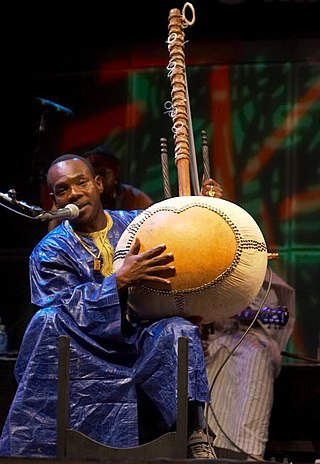
Toumani Diabaté is a Malian kora player. In addition to performing the traditional music of Mali, he has also been involved in cross-cultural collaborations with flamenco, blues, jazz, and other international styles. In 2006, the London-based newspaper The Independent named Diabaté one of the fifty best African artists.

Habib Koité is a Senegalian born Malian musician, singer, songwriter and griot based in Mali. His band, Bamada, was a supergroup of West African musicians, which included Kélétigui Diabaté on balafon.

Ba Cissoko is a Guinean world music band featuring five members, two of whom play the traditional Kora harp. Two band members play percussion instruments and one plays bass. The sound of the band has been described as "West Africa meets Jimi Hendrix".

Sona Jobarteh is a Gambian multi-instrumentalist, singer and composer. She is from one of the five principal kora-playing griot families of West Africa, and is the first female professional kora player to come from a griot family. She is the cousin of the celebrated kora player Toumani Diabate, and is the sister of the diaspora kora player Tunde Jegede.

Articles related to Mali include:
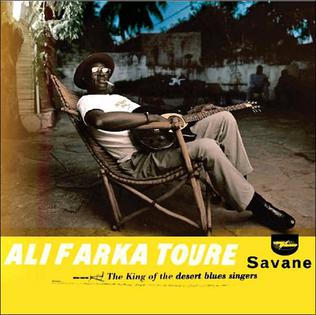
Savane is the final solo album by Malian musician Ali Farka Touré. It is the third and final part of the Hôtel Mandé Sessions, featuring Touré and Toumani Diabaté, recorded by World Circuit head Nick Gold. The album was released posthumously by World Circuit on 17 July 2006, more than four months after Touré's death.
Lucy Durán is a British ethnomusicologist, record producer and radio presenter. In the 1980s, Durán worked as a curator at the British Library National Sound Archive. She joined SOAS University of London in 1993, and is Professor of Music with special reference to Africa and Cuba, in the School of Arts. She is the daughter of Spanish composer and civil war veteran Gustavo Durán and the sister of poet Jane Duran and author Cheli Duran.
Ramata "Rah" Diakité was a Malian Wassoulou woman musician. She was the cousin of Tata Diakité, who also died young.
Oran Etkin is a jazz and world music musician.
Mamadou Sidiki Diabaté is a prominent Mandé kora player and jeli from Bamako, Mali. He is the 71st generation of kora players in his family and a son to Sidiki Diabaté.
Chamber Music is an album by Ballaké Sissoko and Vincent Segal. It was released in 2009 by the French label No Format! and in 2011 by the U.S. label Six Degrees Records. The result of a close collaboration between the two friends and musicians, it melds Sissoko's traditional kora playing with Segal's trip hop infused approach to the classical cello.
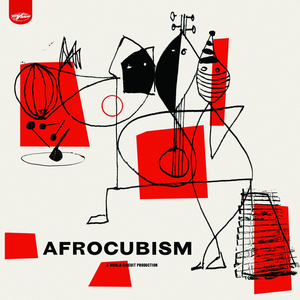
AfroCubism is a Grammy-nominated album featuring musical collaborations between musicians from Mali and Cuba. It was released in 2010.

New Ancient Strings is a studio album by the Malian musicians Toumani Diabaté and Ballaké Sissoko, released on 22 June 1999 by the British label Hannibal Records. The album comprises eight instrumental duets composed by Diabaté for kora, a stringed instrument of West African music. Diabaté and Sissoko are esteemed as the best and the second-best kora players of their generation, respectively. Their duets were recorded in a single live take within a marble hallway of Bamako's conference centre on the night of 22 September 1997, coinciding with Mali's Independence Day.
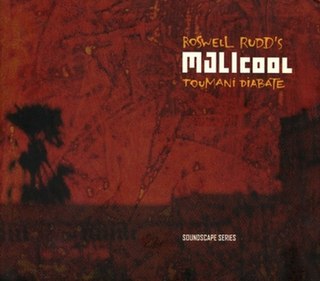
Malicool is an album by American trombonist Roswell Rudd and Malian kora player Toumani Diabaté. It was recorded in January 2001 at Studio Bogolan in Bamako, Mali, and was released by Sunnyside Records in 2002. On the album Rudd and Diabaté are joined by balaphone player Lassana Diabate, ngone player Bassekou Kouyate, guitarist Sayon Sissoko, bassist Henry Schroy, djembe player Sekou Diabate, and vocalists Mamadou Kouyate and Dala Diabate.
Kassé Mady Diabaté was a Malian singer, musician and griot. His soft and particular voice with deep undertones – an atypical characteristic for a griot – earned him the nickname "The golden voice of Mali". He is considered, together with Salif Keita, as one of the greatest Mandinka artists of his generation.













